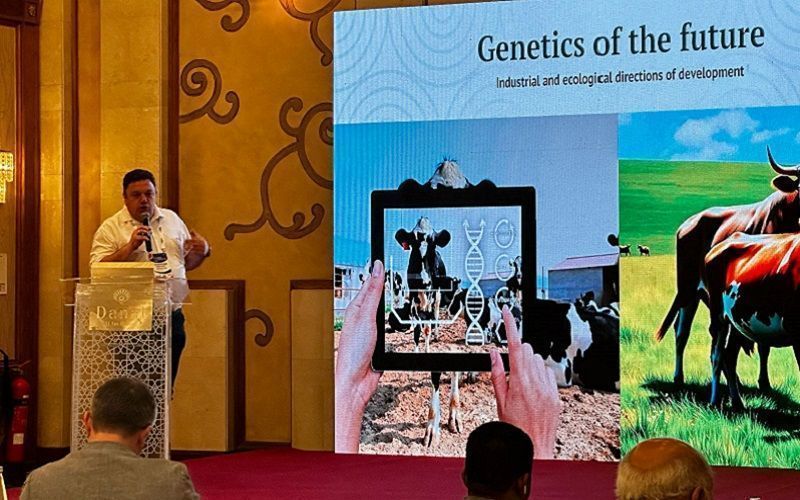Farm of the Future: Between Robotics, Ecology, and the Farmer’s Image
What will a dairy farm look like in 20–30 years? This question was at the heart of a presentation by Alexander Sayapin, founder of the robotic farm LLC "Strelnya", at the 2025 Dairy Olympics.

Over the past 15 years, Alexander Sayapin has grown from managing 20 to 1,800 dairy cows, building a high-tech farm with minimal human involvement. Today, he reflects on the future of the industry, pointing to three key pillars for the sustainability of the dairy sector: automation, environmental responsibility, and image.
“The farm of the future is a space without people. Management is handled by artificial intelligence, operations by robots—or... by the cows themselves,” Sayapin says with a smile.
But he emphasizes that technological efficiency is not the only goal. The main challenge is maintaining a balance between production and how the end consumer perceives the product.
“Consumers don’t want to drink milk from a sterile box, produced who-knows-how and by whom. They want to see pastures, cows, humane treatment, and clean nature,” the expert notes.
In Sayapin’s view, the industry needs to support two parallel models of development:
Ecological mini-farms, focused on image, direct consumer connection, and agrotourism.
Industrial complexes, responsible for the bulk of milk production for the mass market.
Both models require automation and deep integration with AI, but with different core purposes: image for the first, operational efficiency for the second.
Despite widespread robotization, completely removing humans from agriculture is impossible. Sayapin believes the sector must rethink the image of the agricultural worker.
“If we want young people to join the agri-sector, we have to talk not just about technology, but about status. The farmer’s profession needs to become prestigious,” he says confidently.
“The ideal cow is one that doesn’t get sick, eats little, and gives a lot,” he jokes.
But he acknowledges that with climate challenges, a shifting economy, and increasing environmental standards, farmers must adapt. The key will be flexible strategies and a readiness to invest in innovation—whether that means digital monitoring, automated milking, or new sales channels.
Three key takeaways from Alexander Sayapin for the future of the dairy sector:
“The farm of the future is a space without people. Management is handled by artificial intelligence, operations by robots—or... by the cows themselves,” Sayapin says with a smile.
But he emphasizes that technological efficiency is not the only goal. The main challenge is maintaining a balance between production and how the end consumer perceives the product.
“Consumers don’t want to drink milk from a sterile box, produced who-knows-how and by whom. They want to see pastures, cows, humane treatment, and clean nature,” the expert notes.
In Sayapin’s view, the industry needs to support two parallel models of development:
Ecological mini-farms, focused on image, direct consumer connection, and agrotourism.
Industrial complexes, responsible for the bulk of milk production for the mass market.
Both models require automation and deep integration with AI, but with different core purposes: image for the first, operational efficiency for the second.
Despite widespread robotization, completely removing humans from agriculture is impossible. Sayapin believes the sector must rethink the image of the agricultural worker.
“If we want young people to join the agri-sector, we have to talk not just about technology, but about status. The farmer’s profession needs to become prestigious,” he says confidently.
“The ideal cow is one that doesn’t get sick, eats little, and gives a lot,” he jokes.
But he acknowledges that with climate challenges, a shifting economy, and increasing environmental standards, farmers must adapt. The key will be flexible strategies and a readiness to invest in innovation—whether that means digital monitoring, automated milking, or new sales channels.
Three key takeaways from Alexander Sayapin for the future of the dairy sector:
- The future is hybrid: automation and sustainability must go hand in hand.
- The consumer matters: trust in milk begins with trust in the farm.
- People remain essential: without rebranding the profession, the talent shortage won’t disappear.
Gold Partners
- Al Ain Farms Group
- Imperial
Innovation Partners
Partners
Key News of the Week










